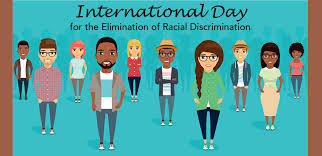DESIBUZZCanada
Events Listings
Dummy Post

International Day Of Yoga To Be Virtually Celebrated Saturday At 4pm

CANCELLED: Coronavirus Fears Kills Surrey’s Vaisakhi Day Parade

ADVERTISE WITH US: DESIBUZZCanada Is The Most Read South Asian Publication Online

SURREY LIBRARIES: Get Technology Help At Surrey Libraries

WALLY OPPAL: Surrey Police Transition Update On Feb. 26

GONE ARE THE DAYS - Feature Documentary Trailer

Technology Help At Surrey Libraries

Birding Walks

Plea Poetry/short Story : Youth Contest

International Folk Dancing Drop-in Sessions
DOWN WITH RACISM: “Gone Are the Days” - Racism In Any Form Is Condemnable
- March 18, 2020

By Zile Singh - Ambassador (Retd.)
Corona is encircling the earth day by day.
About its quick retreat, nobody can say.
Till then, wash hands, social-distance and pray.
"Gone are the Days", at least, keep Racism away.
–Zile Singh
March 21 every year is celebrated as the International Day for the Elimination of Racial Discrimination. The Day is observed annually on the day the police in Sharpeville, South Africa opened fire and killed 69 people at a peaceful demonstration against apartheid in 1960. In 1963, the United Nations General Assembly proclaimed the Declaration on the Elimination of All Forms of Racial Discrimination. The Declaration affirmed the fundamental equality of all persons and confirmed that discrimination between human beings on the grounds of race, colour or ethnic origin is a violation of human rights and is an obstacle to friendly and peaceful relations among nations and peoples.
First of all, what is Racism? As per Etymology, “Racism is the belief in the superiority of one race over another, which often results in discrimination and prejudice towards people based on their race or ethnicity.” The use of the term “racism” does not easily fall under a single definition. It has different forms and manifestations. It is not just a ‘belief’ but a ‘reality.’ The word came into widespread usage in Europe and North and South America in the 1930s, when it was used to describe the social and political ideology of Nazism, which saw “race” as a naturally given political unit. Historical examples of institutional racism include the Holocaust, the Apartheid regime in South Africa, Slavery and Segregation in the United States and Slavery in Latin America. Racism was also an aspect of the social organization of many colonial states and empires.

Initially, racism was restricted to colour of the skin, mainly white and black. Gradually, the definition of racism encompassed ethnicity like the First Nations. The ideology underlying racism often includes the idea that humans can be subdivided into distinct groups that are different due to their social behaviour and their innate capacity as well as the idea that they can be ranked as inferior or superior on the basis of their education, profession and way of living.
It might not be inappropriate to say that the term ‘racism’ has become a football. All are free to kick the way it suits them. The time and place have turned the ‘once perpetrators’ to ‘the victims’ of the same human abuse. One feels the abuse when one is a victim, but not when the same person is the perpetrator of that abuse. One wants equality but at the same time, one wants to be unequal.
“Gone Are the Days” is a Documentary of the epic struggle of Canadian-South Asian Veterinarians led by Dr. Hakam Bhullar to fight against institutional racism for over a decade to get justice. January, this year, the Documentary, written, directed and produced by Mr. Paul Dhillon of MMM Films, was awarded Jaipur International Film Festival’s Runner-Up Prize.
Canada has an outstanding parliamentary form of democracy, an ideal Constitution, the Charter of Rights and Freedoms and Provincial and Federal Human Rights Commissions to ward off any form of discrimination on any ground, including race. Canada is a multicultural and multi- ethnic country in the world to be enjoyed by its citizens. With these fascinating attributes, Canada is an attractive and easy destination for immigrants. The Refugees’ policy of the Canadian government is second to none. Prime Minister’s statements and actions on the ground to establish his stand on ‘anti- racism’ are historic. To withdraw his party’s candidate, who uttered ethnic words during an election campaign last year is an example.
On this International Day to Eliminate Racism, the immigrants should celebrate their exemplary success achieved in all walks of public and private life. No doubt, it was a continuous struggle by our pioneers, but this would not have been possible without a liberal, inclusive and anti-racist policies in place. On this Day we have to reflect if the freedoms and rights are being protected as they ought to be and what that means for the future. On the other hand, we must also realize whether, somewhere down the line, our choice of freedoms is not making us distinctly apart from others leading to an ‘exclusive’ rather than an ‘inclusive’ people and culture. Often, ‘my way is the right way’ leads nowhere. We have to watch whether our localities and our neighbourhoods are not termed as ‘violence-affluent and drug-dens’. Legislation, education, law enforcement agencies and above all, public responsibility have a great role to play in this regard.
Racism, xenophobia and intolerance are problems in all societies. Each and every one of us can stand up against racial prejudice and intolerant attitudes.
“Achievement has no colour”- Abraham Lincoln.

Mr. Zile Singh is a much respected Link Columnist, writer, a Vipassana Meditator and has a Post-Graduate Diploma in Human Rights. He can be reached at zsnirwal@yahoo.ca

















